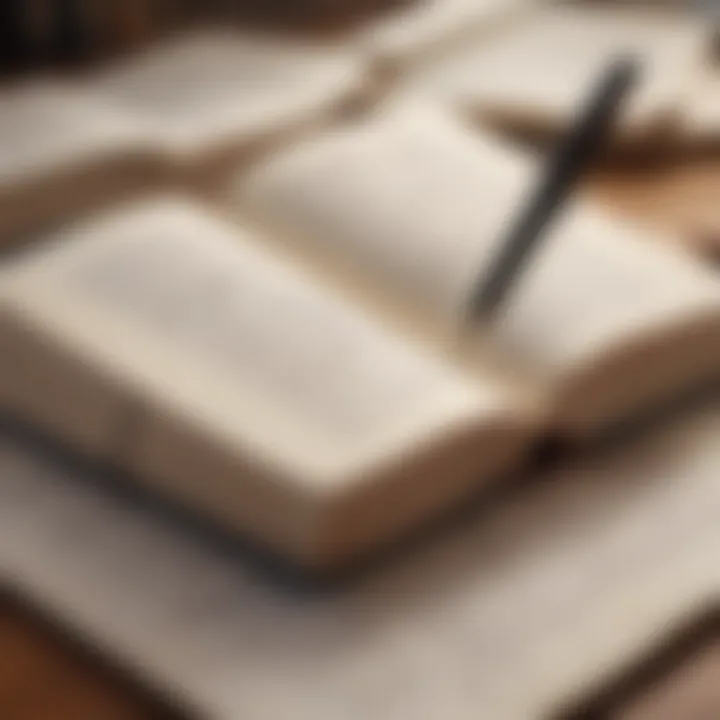Essential Reading for Newcomers: A Book Guide


Intro
Navigating the world of books can feel like standing at the edge of a vast ocean, with countless titles bobbing on the surface, each promising an adventure or a lesson. For those just dipping their toes into reading, knowing where to start can be daunting. This guide seeks to simplify that journey by presenting essential literature tailored for beginners across various genres.
Reading is more than just a pastime; it's a gateway to personal growth, understanding, and reflection. Whether you're looking to escape into fictional worlds, gain insights into your life, or simply feed your curiosity, there exists a wealth of titles that can fuel those desires. This article aims to break down the best books for beginners, making it easier to explore new ideas and perspectives.
With an organized approach, readers will find categories that resonate most with them, fostering not only a love for reading but also a deeper understanding of the material. Armed with summaries and key insights, you will be well-prepared to select books that match your interests and goals. Together, let’s embark on this literary journey.
Prelude to the World of Books
Books are not merely bundles of paper bound together; they are gateways into new realms, ideas, and perspectives. In today's fast-paced world, the significance of reading is often overlooked. Yet, immersing oneself in literature can cultivate not just knowledge, but also empathy and critical thinking. Whether it’s fiction, non-fiction, poetry, or essays, engaging with diverse written content plays a transformative role in personal and intellectual development.
There’s power in the written word. Diving into a book allows individuals to escape their immediate surroundings and experience life through another's eyes. This process not only entertains but also broadens horizons. By reading, not only do we encounter different cultures, but we also grapple with complex moral quandaries, envision scenarios outside our own experiences, and build a more nuanced understanding of the world.
At the heart of this exploration lies a fundamental question: What does it mean to be a beginner in the vast library of human thought? Recognizing the right materials to start with can be overwhelming, which is why this guide places emphasis on carefully curating a selection of books that pave the way for those just starting out.
The Importance of Reading
Reading enriches both the mind and the soul. The process of picking up a book is akin to holding a key to unlock chambers of wisdom and creativity. Here are several key reasons why reading is so crucial:
- Cognitive Development: Regular reading stimulates brain function, nurturing vocabulary and comprehension skills.
- Emotional Connection: Literature can foster a sense of community, allowing readers to see themselves in the characters and stories portrayed.
- Personal Growth: It challenges readers to think critically and form opinions, pushing them out of their comfort zones.
As individuals engage with words, they begin to unravel the layers of meaning that texts can offer, transforming mere letters into profound insights. It is not just about understanding sentences, but about forging connections with ideas that ripple outwards into all areas of life.
Understanding Different Genres
Just as a painter may choose from a palette of colors, readers can select from a variety of literary genres, each with its unique flavor and appeal. Here’s why understanding genres is a stepping stone for beginner readers:
- Finding Your Niche: Exploring different genres can help readers discover what resonates with them. Some might find warmth in heartwarming romances, while others may thrive in the adrenaline of a thriller.
- Cultural Insights: Various genres reflect the values, struggles, and experiences of different societies. This awareness enriches the reader’s ability to appreciate diversity.
- Varied Reading Styles: Each genre has its rhythm. Knowing these differences aids readers in approaching texts with the right mindset. For instance, the analytical nature of non-fiction contrasts sharply with the imaginative leap required for science fiction.
"A reader lives a thousand lives before he dies. The man who never reads lives only one." - George R. R. Martin
Defining 'Beginner' in Literature
Understanding the term "beginner" in literature is crucial for any newcomer to the literary world. This section will explore what inherently makes someone a beginner reader, the unique characteristics that define them, and how this impacts their journey into reading.
Who are Beginner Readers?
Beginner readers are those who are just starting their exploration of books, either through personal choice or due to life circumstances. They might be children discovering the magic of storytelling for the first time or adults who are picking up their first novel after years away from reading. The traits of beginner readers can vary widely:
- Age: Often, children aged six to twelve fall into this category, but that doesn’t exclude older individuals who might not have had the opportunity to read extensively before.
- Exposure: Beginner readers may have limited exposure to varied genres, making them unfamiliar with different narrative styles and author voices.
- Confidence Level: There might be hesitation in choosing a book, stemming from fears of not understanding complex themes or being overwhelmed by long texts.
"Every expert was once a beginner." This saying rings true across many domains, including literature. Embracing the status of a beginner allows for growth and discovery.
Encouraging beginner readers is essential, as their initial experiences can shape their reading habits for years to come. The right book can ignite a passion that, in turn, leads to broader exploration into intricate themes, character development, and literary styles.
How to Identify Beginner-Friendly Books
Knowing how to discern which books are beginner-friendly can significantly enhance the reading experience. Here are key indicators to look for:
- Simple Language: Books that utilize straightforward language and clear sentences make comprehension easier.
- Short Chapters: Titles with short, digestible chapters can prevent overwhelming readers and maintain their interest.
- Relatable Themes: Books that explore familiar or universally relatable situations help in making the reading experience more engaging.
- Illustrations or Layout: Novels that incorporate images or an appealing layout can make the text feel less intimidating.
A few illustrative examples include:
- "Charlotte's Web" by E.B. White – This timeless story intertwined with themes of friendship is great for both young readers and adults who want a gentle introduction to literature.
- "The Diary of a Young Girl" by Anne Frank – This diary format can resonate with readers, making it a poignant yet accessible choice.
By focusing on these factors, readers can successfully identify suitable books that enhance their interest and build a foundation for continued literacy exploration.


Fiction: A Gateway to Imagination
Fiction serves as a vital entry point into the vast universe of literature. For beginners, it allows a chance to escape into different worlds, where reality takes a backseat and imaginations can roam free. This genre breathes life into the experience of reading, with characters that become companions and narratives that unfold like the layers of a mystery. Delving into fiction not only cultivates creativity but also develops empathy, as readers begin to inhabit the thoughts and struggles of characters from varied backgrounds.
Classic Novels for New Readers
Classic novels often stand as timeless pillars in the literary world, providing both a challenge and a rewarding experience for beginner readers. Works like Pride and Prejudice by Jane Austen and 1984 by George Orwell offer rich, thought-provoking themes wrapped in engaging storytelling. These novels can serve as mirrors reflecting societal norms that connect with the reader's own experiences.
A useful approach would be to focus on a single classic text per month. This allows room for deeper understanding and discussion. For instance, reading To Kill a Mockingbird can spur conversations about morality and justice, making it not just an act of reading, but a stepping stone toward critical thought.
Contemporary Fiction That Resonates
Contemporary fiction is where many readers find their footing. The narratives are often more relatable, reflecting the complexities of modern life. Books like The Kite Runner by Khaled Hosseini and Where the Crawdads Sing by Delia Owens have grabbed attention not only for their storytelling but for their emotional depth and cultural insights.
These stories resonate with many because they tackle contemporary issues—identity, love, and belonging—in a manner that's digestible yet profound. It becomes essential to explore themes from these works, as they enhance the reading experience and ignite self-reflection among readers, who may be grappling with their own personal challenges.
Short Story Collections Worth Exploring
Short story collections present a buffet of narratives that can attract the most casual of readers. Writers like Alice Munro and Jhumpa Lahiri condense life’s myriad experiences into digestible stories that pack a punch. For beginners, they can be less daunting than a full-length novel and offer instant gratification with each completed piece.
Diving into a collection like Interpreter of Maladies can expose readers to different perspectives and writing styles. It allows readers to dip their toes in while providing a platter of varied emotions and situations. Through short stories, one can explore the nuances of human relationships in twenty pages or less, making them an excellent starting point.
Fiction is not just made up stories; it’s a reflection of humanity, a display of what’s possible in life and beyond.
In summary, the world of fiction is broad and inviting, rife with opportunities for beginners. From navigating the classics to embracing contemporary works and short stories, there is something for everyone. This genre encourages personal growth by stimulating the mind and heart, making it a foundation upon which a lifelong reading habit can be built.
Non-Fiction: Expanding Knowledge
Non-fiction plays a crucial role in the literary world, particularly for those stepping into the realm of reading. It transcends mere storytelling to provide knowledge, insights, and real-world applications. This type of literature encompasses a wealth of topics, allowing readers to explore everything from personal growth to deep dives into history and culture. For beginners, diving into non-fiction can be incredibly rewarding, offering direct pathways to understanding complex subjects and gaining practical wisdom.
Biographies and Memoirs of Influential Figures
Biographies and memoirs are essential for beginners as they allow readers to glimpse into the lives of influential individuals. These texts highlight the challenges and triumphs of notable figures, showcasing how ordinary people can effect change or achieve greatness. For instance, consider reading the biography of Nelson Mandela. Not only does it outline his fight against apartheid, but it also paints a vivid picture of resilience and hope amidst adversity.
Engaging with such stories is inspiring and provides a sense of connection. You’re not just reading facts; you’re immersing with personal experiences, lessons, and philosophies that shaped who these figures are. Beginners can learn about navigating challenges in their own lives through the choices these individuals made.
Self-Help Books that Inspire Growth
Self-help books serve as guides for personal development and emotional intelligence. They can inspire readers to take charge of their lives, promoting self-reflection and encouraging actionable steps toward improvement. For someone just starting out, books like "The 7 Habits of Highly Effective People" by Stephen Covey or "Atomic Habits" by James Clear can be life-changing.
These texts often break down complex ideas into manageable portions, catering to the beginner’s experience. They not only address common struggles—like managing stress or setting goals—but also empower readers to develop habits that lead to success. In essence, these books can act as companions, lighting the way toward self-discovery and growth.
Educational Texts for Lifelong Learning
Lastly, educational texts are invaluable for cultivating a mindset of lifelong learning. They span various subjects, from science to philosophy, providing readers with a foundational understanding of different fields. For beginners, delving into topics such as psychology through Thinking, Fast and Slow by Daniel Kahneman can be eye-opening. Readers become aware of the thought processes influencing our decisions and perceptions.
Importantly, engaging with these texts contributes to intellectual curiosity. Curiosity drives learning and fuels a desire to explore beyond the surface. In a world where knowledge is continuously evolving, staying informed through educational literature keeps readers adaptable and informed on current trends and discoveries.
“The mind is not a vessel to be filled but a fire to be kindled.” — Plutarch.
Thus, non-fiction offers an expansive realm for beginners. It provides them with the tools and frameworks to navigate their lives and expand their knowledge, encouraging lifelong engagement with the world around them.
Diving Into Fantasy and Science Fiction
The realms of fantasy and science fiction stand as inviting doorways for novice readers, offering unique landscapes where imagination knows no bounds. At the heart of these genres lies the ability to transport readers into worlds unfamiliar, igniting creativity and curiosity. Whether it’s through enchanted forests or futuristic cities, these narratives encourage exploration beyond the constraints of reality.
Why Dive Into These Genres?
Fantasy and science fiction are more than mere escapism; they act as mirrors reflecting society, pushing the boundaries of what is possible while grappling with philosophical and ethical dilemmas. These genres foster critical thinking, enable readers to consider alternate perspectives, and invite deep discussions about human nature, reality, and the universe. Ultimately, engaging with these genres not only enhances literary appreciation but also cultivates empathy and understanding of complex issues.


"Books are a uniquely portable magic." - Stephen King
Fantasy Worlds for the Novice Explorer
Fantasy literature unearths realms brimming with enchantment, allowing new readers to connect with archetypal journeys and universal themes. A beginner reader can glide through tales such as J.K. Rowling's Harry Potter Series, where friendship, bravery, and the constant battle between good and evil unfold in a Hogwarts filled with magic. For those intrigued by epic quests, The Hobbit by J.R.R. Tolkien presents a perfect introduction to high fantasy, with its whimsical world and vivid characters.
Beyond beloved classics, it’s worth exploring newer titles. For instance, The House in the Cerulean Sea by TJ Klune redefines the parameters of fantasy by presenting a heartfelt narrative that prioritizes kindness and acceptance over conflict.
Noteworthy Titles:
- Harry Potter Series by J.K. Rowling
- The Hobbit by J.R.R. Tolkien
- The House in the Cerulean Sea by TJ Klune
- A Wizard of Earthsea by Ursula K. Le Guin
Each title invites the reader not just to absorb a story, but to immerse in its world, making it easier to navigate complex emotional landscapes as they resonate with the characters’ journeys.
Science Fiction as a Catalyst for Imagination
When it comes to science fiction, the genre stretches the boundaries of creativity by exploring advanced technologies and their potential impacts on society. The stories often mirror contemporary issues, portraying a future that reflects our current dilemmas. For instance, The Martian by Andy Weir unearths the theme of survival against the odds while also revealing mankind's inventiveness. This kind of storytelling does not just entertain but motivates readers to engage with scientific thought and innovation actively.
Moreover, classics like 1984 by George Orwell or Brave New World by Aldous Huxley provoke thought about governance, freedom, and individualism. Presenting such themes in an accessible manner ensures that beginners develop a broader understanding of the genres and the implications of scientific advancement.
Essential Reads:
- The Martian by Andy Weir
- 1984 by George Orwell
- Brave New World by Aldous Huxley
- Fahrenheit 451 by Ray Bradbury
In summary, engaging with fantasy and science fiction nurtures a reflective mindset, essential for storytellers and thinkers alike. As one delves deeper into these genres, it becomes apparent that they hold more than just adventure—they present critical commentary on our world while gifting readers an expansive canvas to imagine the unimaginable.
The Role of Young Adult Literature
Young Adult (YA) literature plays a significant role in a comprehensive guide aimed at beginner readers. It serves as a bridge, connecting the often challenging world of adult literature with the more straightforward narratives of children's books. YA encompasses a diverse range of themes and styles, making it adaptable and relevant for a vast audience.
The beauty of YA literature lies in its ability to tackle the complexities of adolescence. These stories often delve into critical issues, such as identity, relationships, mental health, and social justice, reflecting real-life challenges that many young readers face. This genre doesn’t just entertain; it also provides valuable insights that can shape a reader's worldview.
Why Young Adult Books Matter
YA books resonate with readers because they speak directly to the experiences of youth. They provide a safe space where young adults can explore emotions and dilemmas without judgment. This genre also encourages empathy, as readers encounter diverse characters and cultures that expand their understanding of the world.
Moreover, engaging with YA literature fosters a habit of reading by offering relatable characters and gripping plots. The accessibility of the language and themes allows beginners to navigate these texts with ease. It also creates the spark needed for readers to delve deeper into the literary world.
Recommended Titles for Young Adult Readers
When recommending titles for beginners in the YA genre, it’s essential to offer a variety that appeals to different tastes and preferences. Here’s a selection worth considering:
- "The Hate U Give" by Angie Thomas
This contemporary novel tackles issues of race and identity, following Starr Carter as she navigates life after witnessing a tragic event. Thomas’ writing shines a light on real societal challenges faced today. - "To All the Boys I've Loved Before" by Jenny Han
A light-hearted romantic comedy that involves secret letters and unexpected love, this book is perfect for readers seeking something fun and relatable. - "The Fault in Our Stars" by John Green
A poignant portrayal of love and loss, this story will stick with readers long after they put it down, encouraging emotional reflection. - "Divergent" by Veronica Roth
A thrilling dystopian adventure that immerses readers in a world of choices and factions, sparking interest in not just the book but the genre as a whole. - "The Giver" by Lois Lowry
A classic that touches on themes of memory, choice, and individuality. It prompts younger readers to consider the implications of a controlled society.
Each of these titles serves a unique purpose, offering a glimpse into human experiences that resonate universally, making them ideal for beginners diving into the world of literature.
"Young Adult literature isn’t just a phase; it’s a profound resource for understanding oneself and the world."
By embracing young adult literature, beginner readers not only enhance their literary journey but also equip themselves with knowledge that transcends the pages, setting the groundwork for a lifetime engaged with reading.
Poetry: A Different Reading Experience
Poetry often gets tossed to the wayside when people think about entry points into literature. However, its significance in the literary world cannot be overstated, especially for those just dipping their toes into the vast ocean of reading. Poetry presents feelings and thoughts in a condensed form, often packing an emotional punch that can resonate deeply with readers. Its rhythms, sounds, and images can captivate the mind in ways that prose sometimes cannot.
For beginners, diving into poetry offers a unique reading experience that fosters creative thinking and emotional intelligence. It challenges the reader to interpret meanings and emotions often hidden in layers of language. Unlike novels that can sprawl over hundreds of pages, a poem can capture a moment, a feeling, or an idea in just a few lines. This immediacy can be refreshing and rewarding.
Accessible Poems for Beginners


When starting with poetry, beginners should look for accessible poems that are approachable and relatable. These poems typically use clear language and vivid imagery without heavy reliance on abstract concepts or complex metaphors. Here are a few recommendations that resonate powerfully without losing their straightforward charm:
- "The Road Not Taken" by Robert Frost – This classic poem beautifully illustrates the theme of choices and their consequences,
- "Hope is the Thing with Feathers" by Emily Dickinson – Dickinson's exploration of hope paints an uplifting picture, making it approachable for new readers.
- "I, Too" by Langston Hughes – Hughes provides a strong and accessible narrative about identity and belonging.
- "Cinderella" by Anne Sexton – This reinterpretation of the fairy tale adds depth to a familiar story, inviting readers to engage with its underlying themes.
These poems not only introduce readers to the beauty of language but also provoke thought and discussion, enhancing the overall reading experience.
Understanding Poetic Forms and Techniques
To fully appreciate poetry, it helps to understand various poetic forms and techniques. Here, we break down some common elements:
- Imagery – This technique evokes sensory experience through descriptive language. An example may involve painting a scene with words that appeal to sight, sound, touch, taste, and smell.
- Alliteration – This repetitive consonant sound draws attention and creates rhythm, enriching the poem's lyrical quality.
- Metaphor and Simile – These figures of speech compare two different things, helping readers draw connections and enhance their understanding of feelings or ideas.
- Rhyme and Rhythm – Many poems utilize rhyme schemes, creating musicality and enhancing memorability.
- Free Verse – This form eschews traditional patterns, allowing for more personal expressions that don’t conform to a strict structure, making it accessible and relatable for beginners.
Understanding these elements can aid beginners in not just reading poetry, but also in appreciating the craft behind it. They can lead to deeper insights into how poets express complex human experiences, and ultimately, create a more enriching reading journey.
"Poetry is language at its most distilled and most powerful.”
Tips for Maximizing the Reading Experience
Reading is not just a solitary activity; it’s a journey, an adventure, and an invaluable skill that unlocks worlds of knowledge and imagination. To truly benefit from this experience, it’s essential to develop strategies that enhance your reading habits. Whether you're a beginner or someone looking to rekindle their love for reading, these tips can help you savor every word you encounter. By focusing on creating a reading routine and engaging with book communities, readers can dive deeper into literature and make their reading time truly rewarding.
Creating a Reading Routine
Routine is the bedrock of consistency, and without it, even the most passionate readers might find themselves sidelined. Establishing a reading routine can help you turn reading from a sporadic hobby into a vital part of your day.
- Set Aside Specific Times
Identify pockets of time that work best for you. This could be during your morning coffee, lunchtime, or before bed. Having a consistent time helps to signal your brain that it’s reading time. - Customize Your Environment
Find a comfortable spot where you can immerse yourself in a book. Dimming the lights or making a cozy nook can create the right mood. If you're distracted by noise, consider using headphones or finding a quiet place to focus. - Start Small
If you’re just starting out, aim for 15 to 30 minutes a day. Gradually increasing your reading time can prevent you from feeling overwhelmed and help maintain your interest in reading. - Mix It Up
Delve into different genres or formats. One day you might tackle a captivating novel, and another you may flip through a collection of essays or poetry. This variety keeps your reading routine fresh and enjoyable.
"Routine is not a straitjacket; it’s a lifeline that helps you navigate the unpredictable waters of your day."
Incorporating these elements in your reading can establish a rhythmic pattern that transforms the act of reading into something you look forward to each day. Like clockwork, you'll find yourself in the pages of a book instead of battling the day’s distractions.
Engaging with Book Communities
Connecting with others who share a passion for reading can amplify the experience beyond mere pages. By engaging with book communities, you not only discover new titles but also gain fresh perspectives.
- Join Online Platforms
Websites like Reddit and Facebook have thriving groups dedicated to various genres and author discussions. Participate in these online spaces where readers share their thoughts and recommendations. - Attend Local Book Clubs
Many local libraries or bookstores host book clubs. These gatherings can be a fantastic way to meet like-minded individuals and discuss books in-depth, leading to richer insights than reading alone. - Follow Book Blogs and Vlogs
There are countless bloggers and YouTubers who review books, provide analyses, and share reading lists. Subscribing to a few can keep your ‘to-read’ pile overflowing and introduce you to books you might never have picked otherwise. - Social Media Engagement
Platforms like Instagram, through Bookstagram, allow readers to showcase their current reads and review them. Engaging with these communities not only brings accountability to your reading goals but widens your horizon as you see different interpretations of the same texts.
In summary, establishing a reading routine coupled with active participation in book communities significantly enhances the reading experience. As you navigate your literary journey, remember that the community aspect not only enriches your perspective but can ignite a passion for reading that lasts a lifetime.
Finale: The Journey of Reading
As we come to the end of this exploration into the world of books, it’s vital to reflect on the importance of reading as a journey rather than just a destination. The act of reading is much more than simply flipping through pages; it can shape thoughts, broaden horizons, and foster a sense of connection with others. In this guide, we've examined an array of literary selections tailored for beginners, each holding potential to ignite passion for reading.
Reading equips individuals with tools to navigate life. Not only does it stimulate mental functioning, but it can also serve as a means of escape and insight. This dual nature makes engaging with literature an essential practice for personal development. Whether it sparks curiosity about different cultures, ideas, or even the emotional realm, books can have a lasting impact on one's perception and worldview.
Embracing the Lifelong Reading Habit
To truly embrace the journey of reading, one must nurture a lifelong habit. It's about creating an environment where books become a regular part of daily life. This might begin with setting aside a few moments each day to dive into a new chapter or engaging with a current read.
Establishing a routine can enhance focus. Here are a few simple steps to consider:
- Set a target: Aim for a specific number of pages or chapters each day.
- Choose comfort: Find a cozy spot that invites you to read without interruptions.
- Mix it up: Explore various genres to keep the interest alive.
Furthermore, joining book clubs or discussion groups can help foster a sense of accountability and motivation. Readers can share interpretations and insights, turning reading from a solitary endeavor into a communal experience.
“Books are a uniquely portable magic.” — Stephen King
Future Reading Explorations
As you settle into your reading habits, consider the endless potential for future explorations in literature. The world of books is timeless, and there's always something new to discover. From historical epics to modern thrillers, each new read can offer opportunities for growth and discovery.
Keep in mind:
- Follow trends: Stay updated with current literary discussions or emerging authors within the community. Websites like reddit.com have threads dedicated to books that offer fresh suggestions and perspectives.
- Seek diversity: Explore stories from voices outside your own experience. This can profoundly deepen understanding and empathy.
- Challenge yourself: Don’t shy away from complex reads. Sometimes, the more demanding works can yield the richest rewards.
By committing to a lifetime of reading, not only do you cultivate knowledge and insight, but you also embark on a lifelong adventure. Each book, whether fiction or non-fiction, serves as a step on an ever-unfolding path toward self-discovery and enlightenment. As you turn the pages, remember it’s the journey, and the connections made along the way, that will always enrich your life.



